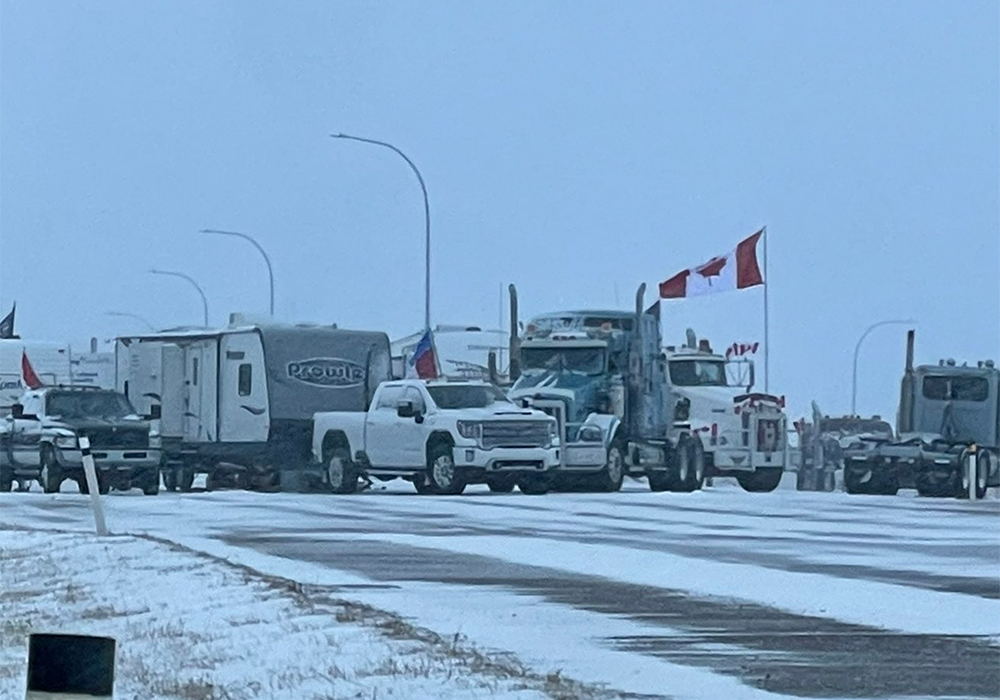The beef industry’s largest producer organizations say they have “serious concerns” about the border blockade near Coutts, Alta., as it wraps up its sixth day.
The Canadian Cattlemen Association, Alberta Beef Producers and the Alberta Cattle Feeders’ Association are all calling on a “timely resolution” to the situation, according to the joint release issued this morning.
ABP co-chair Jason Hale said live cattle imports and exports along with boxed beef heading south and critical feed supplies heading north have been affected by the blockade.
Read Also

Government, industry seek canola tariff resolution
Governments and industry continue to discuss how best to deal with Chinese tariffs on Canadian agricultural products, particularly canola.
Beef processing at Alberta’s Cargill and JBS plants, which are responsible for about two-thirds of the nation’s beef products, will be backlogged, said Hale.
“When you think of the number of cattle at just our two main packing plants in Alberta, that’s a big number of cattle processed every day.”
The impact from that blockage will run down the beef producer line and add costs, he said.
“That just creates a backlog in the feedlots, the finishing lots. It adds days of feed.”
The Western Producer has requested comment on the processing situation from Cargill and JBS but have not received a reply.
Additional costs will eventually trickle down to cow-calf operators, said Hale.
“Historically, the cost increases are felt all across the production chain.”
Work is being done to try to find other Alberta ports that can be used, but that will require negotiations between the U.S. and Canadian governments.
The lack of grain to feed cattle is now raising the level of concern for animal welfare issues in Alberta.
“I know there are feedlots getting close to a time where they are going to need more feed,” said Hale, adding he can’t comment specifically on when some operations might run out.
Hale said people have the right to protest in a democracy.
“But a blockade is different than a protest,” he added.
“We understand their concerns, their issues of why they are doing this, but our focus is on our producers and the cattle industry in Alberta and the rest of Western Canada.”
John Barlow, federal Conservative agriculture critic, echoed the sentiment, stating the blockade must be lifted.
“These are critical infrastructure trade corridors. We need to have products moving, whether that is feed or live animals,” he said. “These things are imperative and in many cases perishable.”
As well, the extra fuel and labour costs needed to detour around Coutts will eventually be passed on to consumers.
Barlow said if protesters continue the blockade, “and if you are causing economic harm and animal health issues, you are going to erode that public support.”
The economic impact is already being felt in nearby Lethbridge, where the city’s economic development agency’s chief executive officer, Trevor Lewington, said the blockade is costing the city $3 million a day.
Those comments came at a noon hour news conference hosted by the city’s NDP MLA, Shannon Phillips, who again called on the provincial government to seek an injunction against protesters and to provide the agricultural sector with aid to cover uninsurable losses.
Hale said the producer organizations are not seeking such aid “at this time.”
As of 5 p.m. MST, 511Alberta lists the highway to the Coutts border as closed, while the Montana transportation department lifted its notice of the border being shut this afternoon.
Traffic cameras on both sides of the border show little to no traffic at the border.
No Alberta government communication on the situation has been released in the last 24 hours.
Meanwhile, supplies and additional protesters flooded into southern Alberta today in support of the blockade as it appears the provincial government and RCMP have lost control of the situation.
The protest started on Saturday as an organized slow roll operation by those opposed to pandemic health restrictions, which ended up turning into an impromptu blockade by the afternoon.
It appears to be gaining supporters by the hour and settling in for the long haul if the province doesn’t meet protesters’ demands to drop health restrictions related to the pandemic.
Those restrictions were imposed to deal with increased deaths and hospitalizations for those with COVID-19 and to help ease the overwhelmed Alberta health system.
Canada’s Indigenous community, who have noted in a variety of statements that the response to the border blockaders is far different than what they’ve encountered in their demonstrations.


















